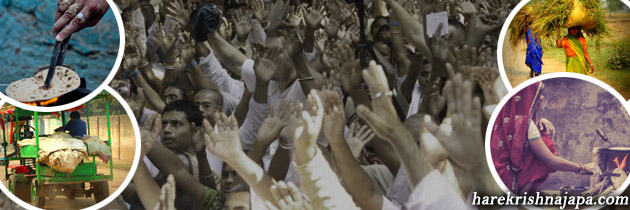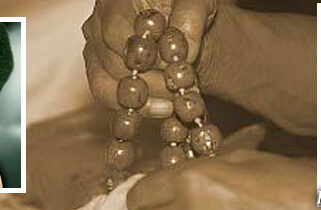07 Where and When one should chant

One can chant anywhere and anytime
The Lord’s holy name must be heard, glorified, and remembered always and everywhere:
[Sukadeva Gosvami to King Pariksit]: O King, it is therefore essential that every human being hear about, glorify and remember the Supreme Lord, the Personality of Godhead, always and everywhere.
All the great acaryas, like Ramanuja, Madhva, Caitanya, Sarasvati thakura or even, in other countries, Muhammad, Christ and others, have all extensively glorified the Lord by chanting always and in every place. Because the Lord is all−pervading, it is essential to glorify Him always and everywhere. In the process of glorifying the Lord there should be no restriction of time and space. This is called sanatana−dharma or bhagavata−dharma. Sanatana means eternal, always and everywhere. Bhagavata means pertaining to Bhagavan, the Lord. The Lord is the master of all time and all space, and therefore the Lord’s holy name must be heard, glorified and remembered everywhere in the world. That will bring about the desired peace and prosperity so eagerly awaited by the people of the world.
– Srimad Bhagavatam 2.2.36
Krsna consciousness can be cultivated anywhere and everywhere, without material arrangements, by chanting the maha mantra:.
It may be questioned herein how the child can be fully Krsna conscious within the womb of the mother without any paraphernalia with which to execute Krsna consciousness. It is not necessary to arrange for paraphernalia to worship the Supreme Personality of Godhead, Visnu. One does not need any material arrangement to cultivate Krsna consciousness. One can cultivate Krsna consciousness anywhere and everywhere, provided he can always think of Krsna. The maha mantra,
Hare Krsna Hare Krsna Krsna Krsna Hare Hare
Hare Rama Hare Rama Rama Rama Hare Hare
can be chanted even within the abdomen of one’s mother. One can chant while sleeping, while working, while imprisoned in the womb or while outside. This Krsna consciousness cannot be checked in any circumstance.
– Srimad Bhagavatam 3.31.21
One can chant the holy name anytime and anyplace:
[Lord Caitanya to Svarupa Damodara and Ramananda Raya]: “Regardless of time or place, one who chants the holy name, even while eating or sleeping, attains all perfection.”
– Sri Caitanya caritamrta Antya lila 20.18
[Lord Caitanya to Svarupa Damodara and Ramananda Raya]: “‘My Lord, O Supreme Personality of Godhead, in Your holy name there is all good fortune for the living entity, and therefore You have many names, such as “Krsna” and “Govinda,” by which You expand Yourself. You have invested all Your potencies in those names, and there are no hard and fast rules for remembering them. My dear Lord, although You bestow such mercy upon the fallen, conditioned souls by liberally teaching Your holy names, I am so unfortunate that I commit offenses while chanting the holy name, and therefore I do not achieve attachment for chanting.”
– Sri Caitanya caritamrta Antya lila 20.16
One can chant Hare Krsna anywhere:
We have only to chant
Hare Krsna Hare Krsna Krsna Krsna Hare Hare
Hare Rama Hare Rama Rama Rama Hare Hare
– The Path of Perfection
Other Instructions
Nama sankirtana can be performed at home, with a small group of friends or with many people in public:
At a public kirtana one person can chant
Hare Krsna Hare Krsna Krsna Krsna Hare Hare
Hare Rama Hare Rama Rama Rama Hare Hare
while a group listens, and at the end of the mantra, the group can respond, and in this way there is a reciprocation of hearing and chanting. This can easily be performed in one’s own home, with a small group of friends or with many people in a large public place.
– The Perfection of Yoga
Chanting the Hare Krsna mantra before the Deity is a regulative principle of Deity worship:
In the Hari−bhakti−vilasa (Eleventh Vilasa, verses 127−40) there is a vivid description of what is required in Deity worship.
There are sixty-four items mentioned. In the temple, worship should be so gorgeous that all sixty-four items should be available for the satisfaction of the Personality of Godhead. sometimes it is impossible to get all sixty-four items; therefore we recommend that at least on the first day of installation all sixty-four items should be available. When the Lord is established, worship with all sixty-four items should continue as far as possible. The sixty-four items are as follows:
(1) There must be a big bell hanging in front of the temple room so that whoever comes into the room can ring the bell. This item is called prabodhana, or offering oneself submissively to the Lord. This is the first item.
(2) The visitor must chant “Jaya sri Radha-Govinda!” or “Jaya sri Radha-Madhava!” when he rings the bell. In either case, the word jaya must be uttered.
(3) One should immediately offer obeisances to the Lord, falling down like a stick.
(4) There must be regular mańgala-arati in the temple during the early morning, an hour and a half before the sun rises.
(5) There must be an asana, a sitting place before the altar. This asana is for the spiritual master. The disciple brings everything before the spiritual master, and the spiritual master offers everything to the supreme Personality of Godhead.
(6) After mańgala-arati, the Deity is supposed to wash His teeth by using a twig; therefore a twig must be offered.
(7) Water must be offered for washing the Deity’s feet.
(8) Arghya should be offered.
(9) Water for acamana should be offered.
(10) Madhu-parka, a small bowl containing madhu (honey, a little ghee, a little water, a little sugar, yogurt and milk) should be offered. This is called madhu-parka-acamana.
(11) One should place wooden slippers before the Lord.
(12) One should massage the body of the Lord.
(13) One should massage the body of the Lord with oil.
(14) With a soft, wet sponge one should remove all the oil smeared over the Lord’s body.
(15) One should bathe the Lord with water in which nicely scented flowers have been soaking for some time.
(16) After bathing the body of the Lord with water, one should bathe Him with milk.
(17) Then one should bathe Him with yogurt.
(18) Then one should bathe Him with ghee.
(19) Then one should bathe Him with honey.
(20) Then one should bathe Him with water in which sugar has been dissolved.
(21) Then one should wash the Deity with water and chant this mantra:
cintamani-prakara-sadmasu kalpa-vrksa-
laksavrtesu surabhir abhipalayantam
laksmi-sahasra-sata-sambhrama-sevyamanam
govindam adi-purusam tam aham bhajami
[Bs. 5.29]
(22) One should dry the entire body of the Lord with a towel.
(23) A new dress should be put on the Lord’s body.
(24) A sacred thread should be placed on His body.
(25) Water should be offered for cleansing His mouth (acamana).
(26) nicely scented oils like liquid sandalwood pulp should be smeared over the Lord’s body.
(27) All kinds of ornaments and crowns should be placed on His body.
(28) Then one should offer flower garlands and decorative flowers.
(29) One should burn incense.
(30) Lamps should be offered.
(31) Precautions should always be taken so that demons and atheists cannot harm the body of the Lord.
(32) Food offerings should be placed before the Lord.
(33) spices for chewing should be offered.
(34) Betel nuts should be offered.
(35) At the proper time, there should be arrangements so that the Lord may take rest in bed.
(36) The Lord’s hair should be combed and decorated.
(37) First-class garments should be offered.
(38) A first-class helmet should be offered.
(39) The garments should be scented.
(40) There should be Kaustubha jewels and other ornaments offered.
(41) A variety of flowers should be offered.
(42) Another mańgala-arati should be offered.
(43) A mirror should be offered.
(44) The Lord should be carried on a nice palanquin to the altar.
(45) The Lord should be seated on the throne.
(46) Again water should be given for the washing of His feet.
(47) something again should be offered for eating.
(48) Evening arati should be offered.
(49) The Lord should be fanned with a camara fan, and an umbrella should be placed over His head.
(50) The Hare Krsna mantra and approved songs should be sung.
(51) Musical instruments should be played.
(52) One should dance before the Deity.
(53) One should circumambulate the Deity.
(54) One should again offer obeisances.
(55) One should offer different types of prayers and hymns at the Lord’s lotus feet.
(56) One should touch the lotus feet of the Lord with one’s head. This may not be possible for everyone, but at least the pūjari should do this.
(57) The flowers offered on the previous day should touch one’s head.
(58) One should take the remnants of the Lord’s food.
(59) One should sit before the Lord and think that he is massaging the Lord’s legs.
(60) One should decorate the Lord’s bed with flowers before the Lord takes His rest.
(61) One should offer one’s hand to the Lord.
(62) One should take the Deity to His bed.
(63) One should wash the feet of the Lord and then sit Him on the bed.
(64) One should place the Lord on the bed and then massage His feet.
– Sri Caitanya caritamrta Madhya lila 24.334
Upon rising in the early morning one should immediately chant the holy name and thus become auspicious and transcendental:
In the early morning hours (known as brahma−muhurta) one should get up and immediately chant the Hare Krsna mantra, or, at least, “Krsna, Krsna, Krsna.” In this way, one should remember Krsna. Some slokas or prayers should also be chanted. By chanting, one immediately becomes auspicious and transcendental to the infection of material qualities.
– Sri Caitanya caritamrta Madhya lila 24.331
Either in danger or happiness, a devotee constantly chants the maha mantra:
[Maitreya to Vidura]: Dhruva Maharaja, seeing that these uncommon personalities were direct servants of the Supreme Personality of Godhead, immediately stood up. But, being puzzled, in hastiness he forgot how to receive them in the proper way. Therefore he simply offered obeisances with folded hands and chanted and glorified the holy names of the Lord. Chanting of the holy names of the Lord is perfect in every way. When Dhruva Maharaja saw the Visnudutas, the direct associates of Lord Visnu, four−handed and nicely decorated, he could understand who they were, but for the time being he was puzzled. But simply by chanting the holy names of the Lord, the Hare Krsna mantra, he could satisfy the uncommon guests who had all of a sudden arrived before him. The chanting of the holy name of the Lord is perfect; even though one does not know how to please Lord Visnu or His associates, simply by sincerely chanting the holy name of the Lord, everything becomes perfect. A devotee, therefore, either in danger or happiness, constantly chants the Hare Krsna mantra. When he is in danger he is immediately relieved, and when he is in a position to see Lord Visnu or His associates directly, by chanting this maha mantra he can please the Lord. This is the absolute nature of the maha mantra. Either in danger or in happiness,it can be chanted without limitation.
– Srimad Bhagavatam 4.12.21





